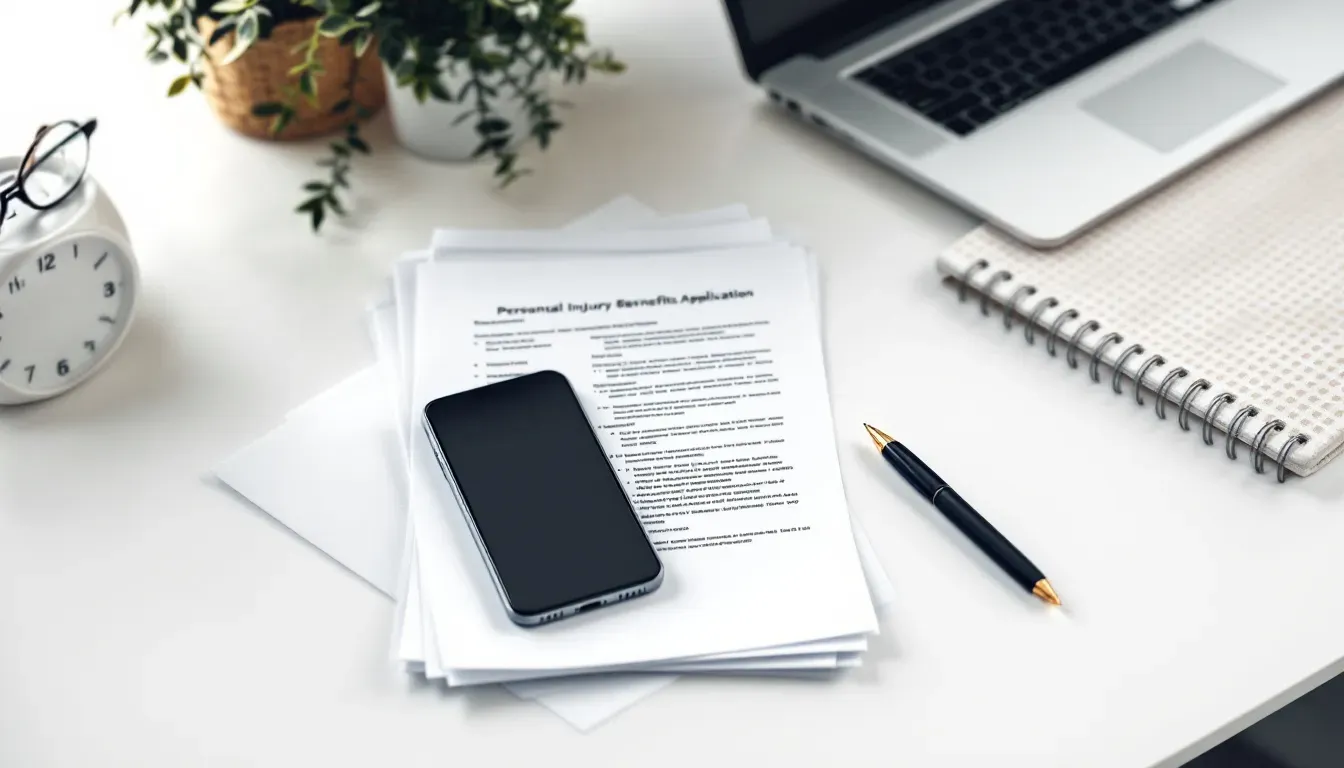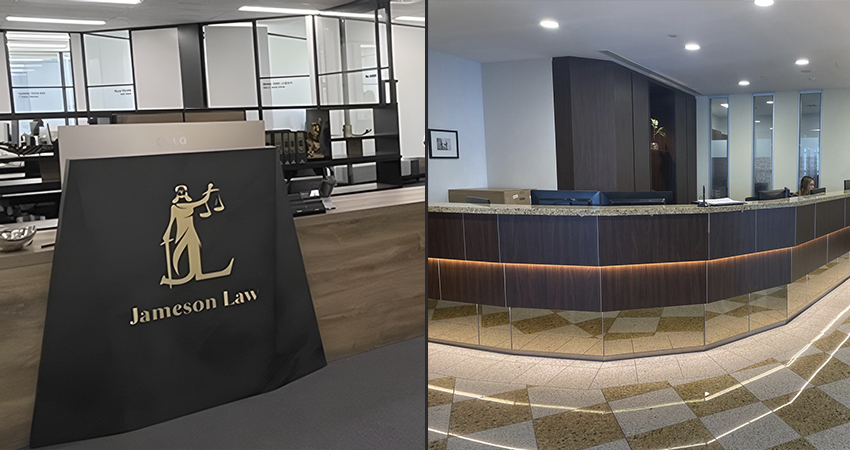Navigating the application for personal injury benefits can be overwhelming, especially when you’re dealing with injuries and recovery. At Jameson Law, we understand the challenges you face during this difficult time.
We’ve created this guide to help you understand the process and take the right steps to secure the compensation you deserve. Our aim is to provide you with clear, practical advice that will make your journey through the personal injury claims process smoother and more successful.
What Are Personal Injury Benefits in Australia?
Types of Personal Injury Benefits
Personal injury benefits in Australia support individuals who suffer injuries due to accidents or negligence. These benefits cover medical expenses, lost wages, and other injury-related costs.
The type of benefit varies based on the accident’s nature and location. Workers’ compensation applies to work-related injuries, while motor vehicle accident benefits cover road incidents. Public liability claims address injuries in public spaces, and medical negligence benefits tackle harm caused by healthcare professionals.
In 2020-2021, 42% of hospitalised injury cases and 40% of accidental injury deaths in Australia were due to falls, highlighting the significance of these benefits.
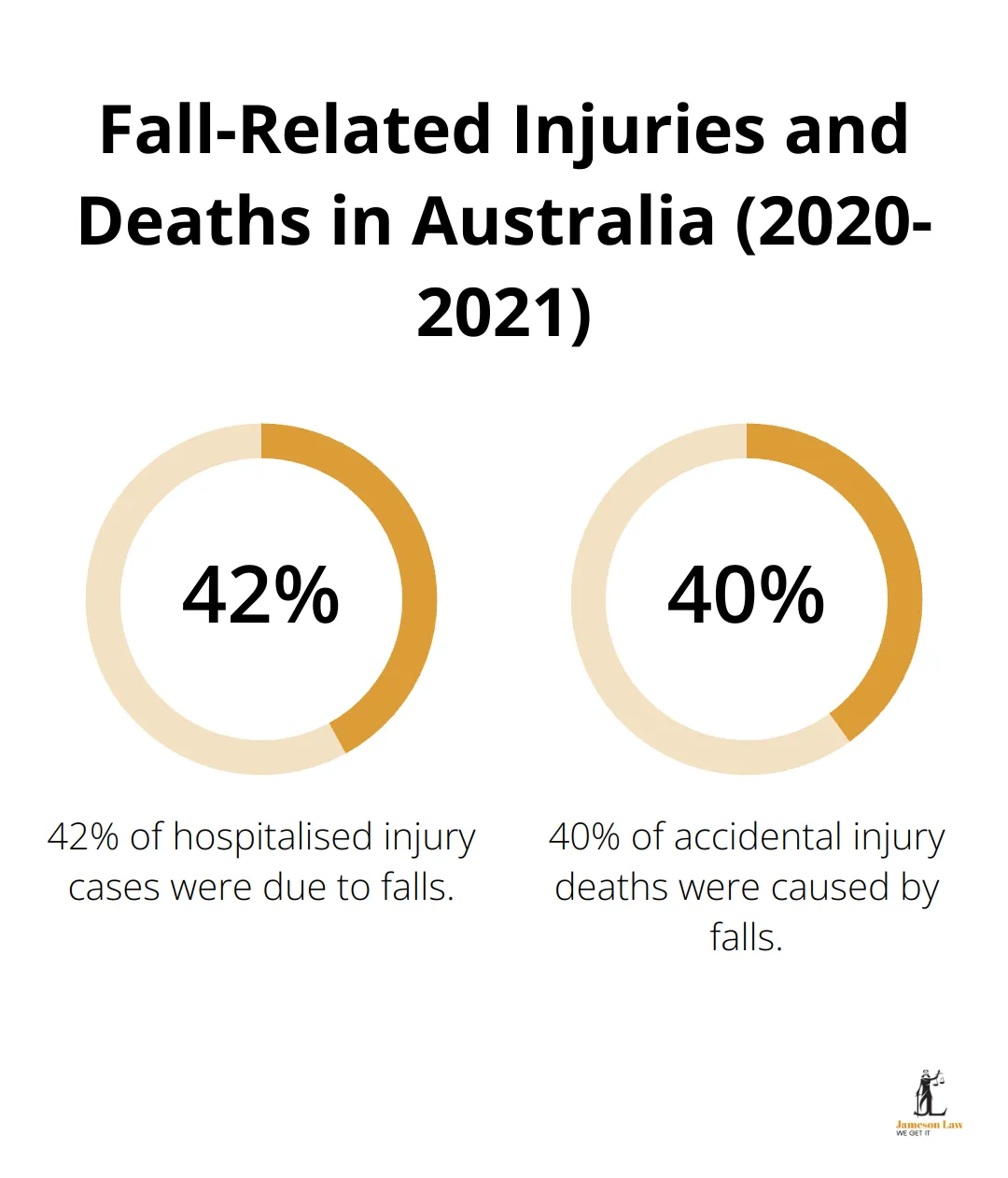
Eligibility Criteria
To qualify for personal injury benefits, you must typically prove another party’s negligence caused your injury. This could involve an employer, driver, property owner, or medical professional. Specific criteria differ based on claim type and jurisdiction.
Time Limits for Claims
Australia imposes strict time limits for lodging claims, which vary across states and territories. In New South Wales, there is a ‘long-stop’ limitation period for personal injuries of 12 years. However, motor vehicle accidents require police reporting within 28 days and claim lodgement within six months.
Navigating the Claims Process
The claims process demands detailed documentation and adherence to specific procedures. For instance, a workers’ compensation claim requires you to report the injury to your employer promptly. By law, every employer is required to have an injury book or accident register for you to fill in.
Many individuals find the intricacies of personal injury claims challenging. Early legal advice can help you understand your rights, gather necessary evidence, and meet all deadlines.
Importance of Professional Guidance
Personal injury law in Australia is complex (with numerous regulations and procedures). A skilled lawyer can provide invaluable assistance in navigating this landscape. They can help interpret legal jargon, negotiate with insurance companies, and ensure you receive fair compensation.
While some may attempt to handle claims independently, professional guidance often leads to better outcomes. Lawyers specialising in personal injury law (such as those at Jameson Law) possess in-depth knowledge of relevant legislation and case precedents, which can significantly strengthen your claim.
The next step in your journey to secure personal injury benefits involves understanding the application process. Let’s explore the steps you need to take to apply for these benefits effectively.
How to Apply for Personal Injury Benefits
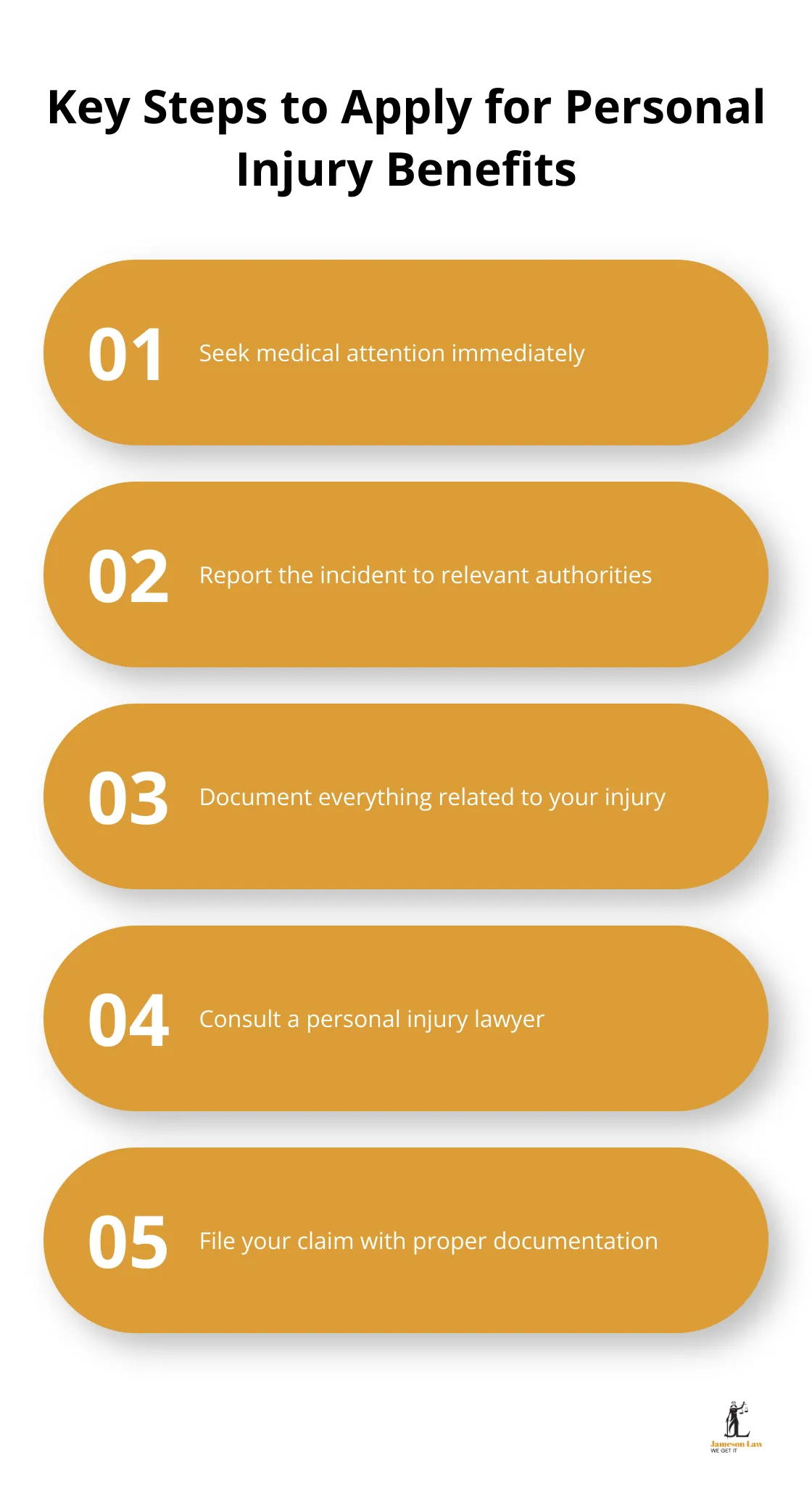
Seek Medical Attention Immediately
Your health should be your top priority after an injury. Visit a doctor or hospital as soon as possible, even if your injuries appear minor. The Australian Institute of Health and Welfare emphasises that hospital-based procedures have been known as effective diagnostic and treatment methods for many ill-health conditions. Medical records also serve as vital evidence for your claim.
Collect all medical documents, including diagnoses, treatment plans, and bills. These records form the foundation of your personal injury claim, demonstrating the extent of your injuries and the associated costs.
Report the Incident
Reporting the incident to the relevant authorities is a key step in the claims process. For workplace injuries, inform your employer immediately. Return to work requirements and responsibilities are set out in workers’ compensation legislation or the policies of workers’ compensation.
For road accidents, contact the police. In New South Wales, you must report any accident resulting in injury or death to the police within 24 hours. Obtain a copy of the police report, as it provides an official account of the incident that can support your claim.
Document Everything
Thorough documentation can make or break your personal injury claim. Take photos of the accident scene, your injuries, and any property damage. Collect contact information from witnesses, as their statements can corroborate your account of the incident.
Keep a detailed diary of your recovery process, including pain levels, medical appointments, and how the injury affects your daily life. This information helps paint a comprehensive picture of the impact of your injury.
Consult a Personal Injury Lawyer
While not mandatory, seeking legal advice can significantly improve your chances of a successful claim. Personal injury lawyers have in-depth knowledge of Australian law and can navigate the complexities of your case.
Many law firms (including Jameson Law) offer a No Win No Fee policy for personal injury claims, making legal representation accessible to all. A skilled lawyer can negotiate on your behalf and ensure you receive fair compensation. They can also help you avoid common pitfalls that could jeopardise your claim.
File Your Claim
Once you’ve gathered all necessary documentation and consulted with a lawyer, it’s time to file your claim. The process varies depending on the type of injury and the relevant jurisdiction. Your lawyer can guide you through the specific requirements and ensure all paperwork is completed accurately and submitted on time.
Insurance companies often try to minimise payouts, so it’s important to present a strong, well-documented case. A lawyer can help you prepare a compelling claim that accurately represents the full extent of your injuries and losses.
The next step in maximising your personal injury claim involves understanding the full scope of your injuries and their long-term impact. Let’s explore strategies to ensure you receive comprehensive compensation for all aspects of your injury.
How to Maximize Your Personal Injury Claim
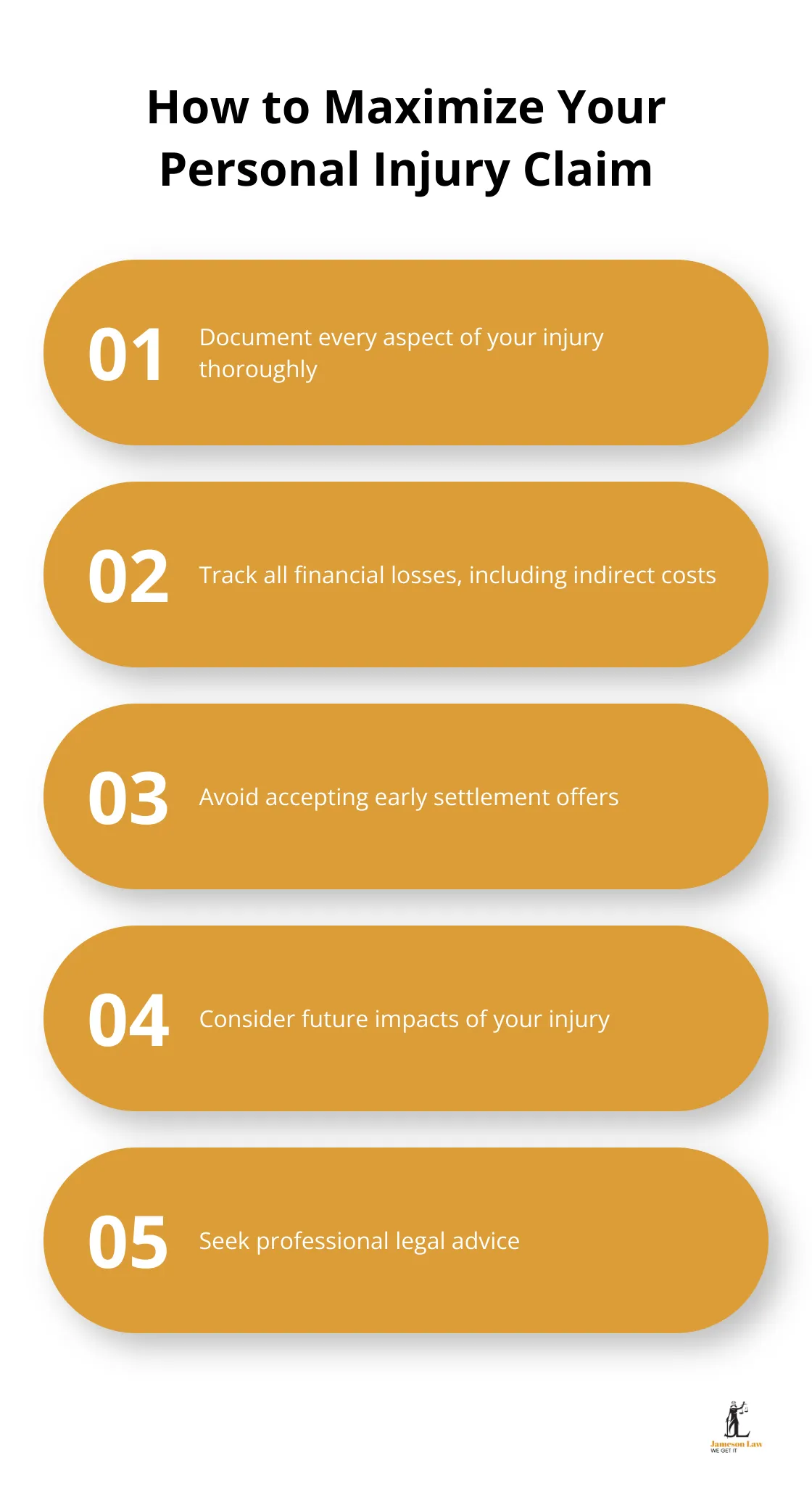
Document Every Aspect of Your Injury
A strong personal injury claim requires comprehensive documentation. This extends beyond medical records. Start a daily journal to detail how your injury affects your life. Record pain levels, mobility issues, and activities you can no longer perform. This personal account provides powerful evidence of the injury’s impact on your quality of life.
Documentation of your injury should include capturing photographic evidence, keeping a detailed injury diary, and organizing all medical records and bills meticulously.
Track All Financial Losses
Account for every dollar spent or lost due to your injury. Include obvious expenses like medical bills and lost wages, but also less apparent costs. Did you hire help for household chores? Did you miss a promotion due to your injury? These indirect financial impacts can significantly increase your claim’s value.
Preserve all receipts, payslips, and any correspondence related to financial losses. If possible, obtain written statements from your employer about lost opportunities or reduced work capacity.
Avoid Early Settlement Offers
Insurance companies often attempt to settle quickly and for less than you deserve. Don’t rush into a settlement.
Take time to understand the full extent of your injuries before you consider any settlement. Some injuries have long-term consequences that may not appear immediately. A premature settlement could leave you without coverage for future medical needs or ongoing disabilities.
Consider Future Impacts
Your claim should account for future impacts of your injury. Will you need ongoing medical treatment? Might you face reduced earning capacity in the long term?
Collaborate with medical professionals to get a clear prognosis of your long-term outlook. This information proves crucial for calculating future losses and ensuring your settlement covers all potential future expenses.
Seek Professional Legal Advice
Personal injury law in Australia is complex (with numerous regulations and procedures). A skilled lawyer can provide invaluable assistance in navigating this landscape. They can help interpret legal jargon, negotiate with insurance companies, and ensure you receive fair compensation.
While some may attempt to handle claims independently, professional guidance often leads to better outcomes. Lawyers specialising in personal injury law (such as those at Jameson Law) possess in-depth knowledge of relevant legislation and case precedents, which can significantly strengthen your claim.
Final Thoughts
The application for personal injury benefits in Australia demands careful planning and execution. You must seek immediate medical attention, document your injuries thoroughly, and report the incident to relevant authorities. Gathering comprehensive evidence and keeping detailed records of all expenses and losses will strengthen your claim.
Understanding the full extent of your injuries and their potential long-term impacts will help you maximize your claim. You should consider future medical needs and possible effects on your earning capacity. It’s also important to exercise caution when dealing with insurance companies, as their initial settlement offers may not fully cover your needs.
While you can navigate the process independently, professional legal advice can significantly improve your chances of a favorable outcome. At Jameson Law, we specialize in personal injury claims and offer expert legal services (across various practice areas). Our team of experienced lawyers is committed to providing tailored legal support and achieving the best possible outcomes for our clients.


